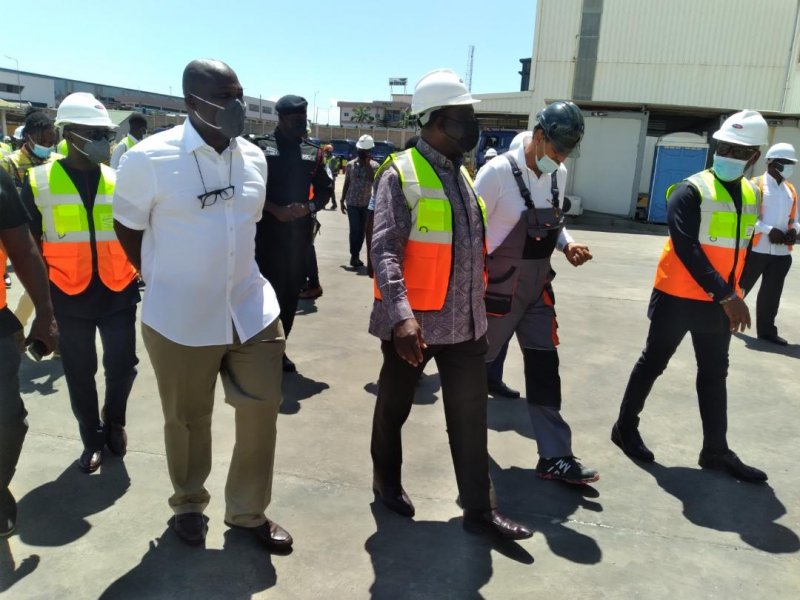|
Listen to this article now
Getting your Trinity Audio player ready...
|
This article is a rant of an overthinker, so please indulge my musing. The inspiration for this write-up started when I was listening to Citi FM’s News Paper Review today 11th May 2021; they shared a story captioned, ‘Trade Minister commends Ibrahim Mahama for investing in cement industry’[1].
My initial reaction was first unbelief and then shock. Unbelief that infrastructure of Government will appreciate such bold enterprise of Ghanaians considering that Dzata Cement was the big conversation for why UT Bank had taken liquidity support and how Dzata Cement had ‘collapsed UT’. But I was also pleasantly shocked that the Trade Minister made that recognition, especially at a time when UT Bank is in Parliament petitioning the revocation of its license.
In part, my unbelief and shock found foundation in the convenience with which we had criminalized the only indigenous bank who believed in this project when it was a bare land – UT Bank and yet find cause a few years down the lane to praise the project.
It did not take time for me to find the Daily Graphic Article dated, August 13, 2018 which read, “A financial autopsy report into the collapse of UT Bank linked its demise to huge non-performing loans, including those of Ibrahim Mahama, a brother of former President John Mahama. Mr. Ibrahim Mahama is said to owe the UT Bank GH¢302 million, a facility that was extended to his four companies in ways that required the bank to bend over backwards.”[2]
It is even more interesting that the story states that one Mr. Fiifi Yawson who was the supervising site engineer had said, “80 percent of the construction and installation works on the facility, costing $200 million, was complete” and that “the projected revenue per day from the sale of cement was a minimum GH¢1 million, and with that projection, Dzata Cement would have paid off the loan with interest in less than five years.”
Yes, one million Ghana Cedi per day was to be collected by UT Bank as it will have had a collecting branch within the factory. My musing is of two parts; first, the question of what is good for Ghana, and the second being more philosophical – is what is good for the goose necessarily good for the gander?
Now that takes me to a rant of a national proportion, #FixTheCountry. A virtual rant by a section of the youth it will seem until one pays attention and recognizes it is a sentiment far deeper. I think the central themes of #FixTheCountry resonate with the same two questions I seek to attend to in this write-up; the question of what is good and is what is good, good for everyone?
The sentiments and obvious evidence of the #FixTheCountry are shown in the request for fixing the road, fix the healthcare, fix ‘Dumsor’, and similar things like that. Hidden in these calls are the loud shouts of, it is good to have good roads, good healthcare, good social amenities, etc.
The question of the good is however a question of value versus values. Is good not a sum of what is valued or do the values that anchor the valuation determine its merit? That is not an easy question to answer especially when good may mean different things to different people. But before I jump ahead of myself to deal with the second part of this article, good must have resonance in ‘order of consequence’ because the short term and long term perspectives will always produce different definitions and values for evaluating ‘good’.
The real question therefore is, is anything still ‘good’ when subject to its ‘order of consequences’ and the long-term view? I think that #FixTheCountry is a fantastic campaign. My reasoning for its good is that in the first order it resolves the basic request for the obvious things to be fixed. In the second-order consequence, it reminds the politician who he is accountable to. In the third order, it aligns the sentiments beyond political lines and maybe in a fourth-order consequence reminds all of us of the existential threat if particularly the problem of unemployment is not fixed.
For once, the sentiments are aligned as Ghanaians, tired of being rich in resources yet poor mostly because of political leadership’s inability to construe reality beyond the cycles of 4 years. So my only contribution to the campaign is #FixTheShortView or better #FixNationalDevelopmentPlanningCommission.
Until we can agree to plan long term and to have a view of defining good in such a long term, a view that is constructed not by politicians but by technocrats on the pure grounds of meritocracy #FixTheCountry will become another nice slogan that was shelved in the interest of a 4-year cycle.
So again, finding bearing with UT Bank, in the long term, do projects like Dzata Cement succeeding make men like Prince Kofi Amoabeng the Heroes we bury like we did Kwame Nkrumah? Does the order of consequences when analyzed question the decision to collapse UT Bank?
Now to the more philosophical question of the universality of good. Let me tell a story, hopefully, it will convey my sentiments better:
Alfred Lewis Jones is known as the Welsh shipping magnate who started his trade as an apprentice to the managers of the African Steamship Company when he was only reported to be twelve years. The sea was his world and voyages to Africa were his way of life. The story continues by telling us that, by the time he was twenty-six, he was the manager of the business he had only started as an apprentice. Interestingly with the view to steam engines as the future of sea travel, he sold the sailing ships to Elder, Dempster & Co. and he was offered a managerial post.
Long story short, Alfred becomes very powerful in West African trade and seeks an interest in setting up Financial Services along the Guinea Coast. In 1892, African Banking Corporation is said to have acquired Elder Dempster’s financial services business in Lagos, Nigeria, and wished to close it down because the financial company was ‘bleeding’ profusely, reportedly the first ‘Bankruptcy’ in banking on the West African Coast.
Alfred Lewis Jones and Elder Dempster & Co. interestingly after selling their failing business formed the newly created ‘Bank of British West Africa (BBWA)’ and bought back their Lagos operation from African Banking Corporation. In 1896, BBWA established a branch in Accra, Ghana. Its main business then was the distribution of silver coins; of which it was the sole supplier.
As the only bank in the country at the time, it came to play a unique role in the economy, acting as the Central Bank. In 1902, it opened another branch in Sekondi. It opened an agency in Obuasi in 1905, which it raised to the status of a branch in 1909. In 1906 it opened a branch in Kumasi. British Bank of West Africa expanded its network to cover most of the main business centers in the Gold Coast and went on to dominate commercial banking in Ghana.
The trap of the story is that; it was good that the modern Ghanaian economy was being monetized but the question remains until today for whose benefit? Control and supply were the gateways to determining the beneficiaries of the good and certainly, the benefits have accrued to where it was engineered for, many generations after. And aww, lest I forget, in 1965 Standard Bank acquired BBWA (which had been renamed Bank of West Africa in 1957) and renamed it Standard Bank of West Africa. Standard Bank merged with Chartered Bank to form Standard Chartered Bank in 1969. You must love history.
The untold part of the story however is Seigniorage. Seigniorage is a very interesting economic idea. It is the idea that there is a difference in valuation between production which is the real tangible value and the monetary face value placed on production by money. Seigniorage is therefore the difference between the face value of money, such as a GHS100 note, and the cost to produce it. These differences in real value and monetary value points to a far bigger problem: a problem that monetary valuation may not be indicative of value – given that tangible effect in the economy may be disproportionate.
Agreeably, seigniorage can be positive or negative, but let the economist deal with the details, the point to be made is that, balance is found in more than monetary valuation and that is where finance ends and politics begins. The rant of #FixTheCountry has a tone of frustration which has been met with the nice ‘monetary’ response of ‘Ghana Cares Obaatanpa Programme’.
Today is not for policy evaluation, its day will come. Today is for making the point that, any program may be good for someone who benefits to the exclusion of everyone else. Today is to emphasize the point that, political tone and use of power or the abuse of it determines the real value and not the economic rhetoric.
And so yes, have programs of whatever ‘obaa’ nature, but also have sentiments that understand the real pulse for valuation. My name is Yaw Sompa, I believe in the future of the African Youth. I believe good servant leaders will rise to be good for everyone. I believe the African will rise to value his own. I earnestly pray however that the African comes to realize, whether it was slavery or colonization, the partition of Africa, or the monetization of the economy for the benefit of the colonizers, one thing was certain – Internal Disunity and External Longview for Domination. #FixTheCountryPeriod.
[1] https://www.gna.org.gh/1.20721740
[2] https://www.graphic.com.gh/business/business-news/allegation-that-ibrahim-mahama-owed-ut-bank-gh-302-million-inaccurate.html



Great write up although I disagree with the bit about ” Criminalizing UT Bank.
#FixTheCountry indeed! Nice history about SCB and its worth noting that UT Bank is part of the success story of now Dzata cement. Excellent!
Samuel, great blog, and i hope it will get people really thinking deep about some of these questions you have posed. All i was saying through out my reading is hmmm, hmmm all the way down to the end of the blog!!. Its just sad!
You see, our country is currently in a serious crisis! And no matter where we turn, we see the elephant in the room but we jump right over it and focus on other things. You know my husband and i were talking this week about this #FixTheCountry demonstration and perhaps the “real” motives behind the group that were engineering the demonstration!!. I believe we had this same “fixthecountry” demonstrations in the past government period, abi?. But what did this yield? Nobody is coming to the table as long as we have two parties whose individual members believe the country can be run better by them individually and try to make each other look bad, instead of focusing on the good each one has contributed in the past and see how to rectify the bad so it will never happen again!!. What did the bible say about a divided household?? It WILL NOT STAND!!! And yet we are building a house for God (National Cathedral) and refuse to listen to the wisdom that comes from His Holy words. We are first GHANAIANS before anything thing else!!!
No one wants to go according to the rules in this country or at least agree some rules and hold ourselves ACCOUNTABLE to those rules!!. How is it even possible that UT bank will give a single company (even though you stated 4 companies, its actually one!!!), such a huge amount of money? Was that within the rules? what was the collateral for this? And did it kick in at the point the risk was materializing? These are basic risk management principles, “preventive, detective and corrective CONTROLS”. How long before the regulating body saw that the financial ratios were way below the agreed target?? the “regulatee” and the regulator both defaulted in their duties and did NOT hold themselves accountable!!! We glorify wrong, instead of calling a spade a spade, we say we should not wash our dirty linen in public!! CULTURE!!! This is definitely playing a significant role…. how do we embed it in such a way its not destructive? I don’t have the answers…..
1. I believe as a people we have already identified the root Causes of our problems, even the CONTROLS we need to put in place, but because the benefits go to a few people who hold the POWER to take the decisions, implement and monitor all in the same capacity, there will be no response to the fallouts when it materializes. LEADERSHIP, ACCOUNTABILITY and PROBITY is lost!!
2. Until we are able to define the word “patriotism” and what it means for our country and our generations to come (NOT Individuals),and put in the plan, the laws and regulations based on it and HOLD OUR SELVES ACCOUNTBLE, LEAD BY EXAMPLE and PROBE without favoritism, we will continue to run around in circles in this country!!!
We need a national dialog, but yet who is there to led this dialog?? We need a national PLAN, but yet who is there to develop this plan? we need Policies that a re devoid of exclusive powers invested in one person!!! but Yet who is there to put these policies in place. SELFLESSLY is lost??
Ethics, is conducting ourselves with the utmost credibility, trust, fairness, honor, truth (and the list goes on and on), EVEN When NO ONE Is Watching. I rest my case!!!